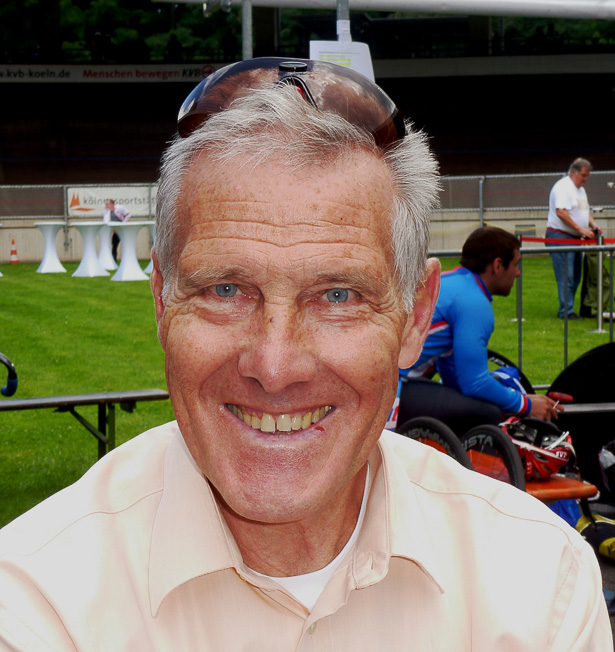
Nowadays the big team pursuit rivalry is between GB and Australia; but back when ‘I were a lad’ in the early 70’s whilst the times weren’t as fast – the 1972 Olympic final in Munich was won in 4:22 – the rivalry was much more intense.
It wasn’t just the colour of the jerseys, there was a huge ideological gulf between the West and East German teams.
The inscrutable ‘Grey Ghosts’ from the Communist East against their ‘decadent’ Western neighbours.
In Munich it was the ‘Capitalists’ who won, that 4:22 beating the men from the Baltic coast by three seconds with GB third in 4:23 – Ian Hallam, Ron Keeble, Willi Moore and Mick Bennett wearing the classic red and blue silk of GB on that occasion.
No ‘superbikes’ back then; Bob Jackson, Geoffrey Butler, Harry Quinn and Roy Swinnerton respectively supplying the hardware.
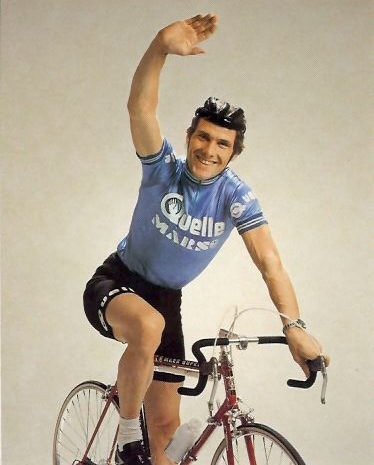
Not a bit of carbon to be seen anywhere – but didn’t those Super Champion rims and chrome spokes sparkle?
One of the men in the victorious West German team went on to become a Six Day star, Udo Hempel.
Hempel first raced as a junior in 1961, winning his place on the national track squad in 1967 and taking silver in the 1968 Olympic team pursuit in Mexico.
A stalwart on the West German team pursuit squad for the next four years, his reward took just those four minutes and 22 seconds to achieve and made him an Olympic champion in front of an adoring home crowd.
Hempel turned pro after the Munich Olympics and would go on to ride 116 ‘races to nowhere’ finishing in an impressive 114 of them.
The man from Dusseldorf rode with 42 different partners during his career which ended in 1983.
In the course of research on Britain’s first black cycling champion and a man who rode 46 Six Days – Maurice Burton – we had the pleasure to speak to Udo; here’s what he had to say to VeloVeritas.
Olympic team pursuit silver in 1968 then gold in 1972 as well as Worlds bronze in 1971 – have I missed any results?
“I was also eight times the Champion of Germany in events from the sprint to the madison.”
How difficult was it to get your first Six Day contracts?
“It was not difficult because we won the gold medal in the team pursuit at the Munich Olympics so I was well known to the public and a draw card for the promoters.”
How difficult was the jump to the professionals?
“The transition was very difficult because as an amateur I was working as an area manager for Siemens and didn’t have very much time for training.”
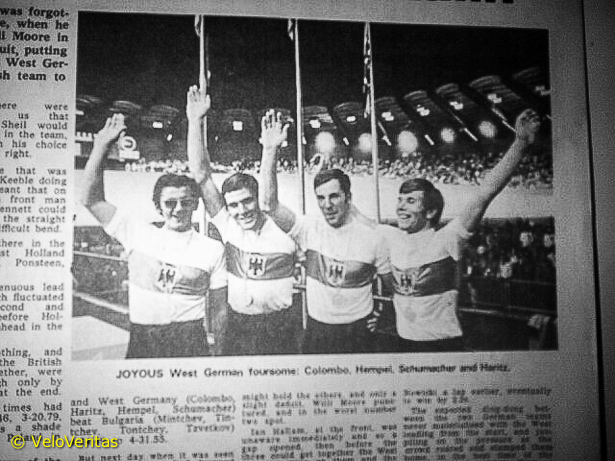
You turned pro in 1973 and raced for 11 seasons – how did you keep in shape during the summer?
“We rode the kermises in Belgium and The Netherlands and road races in Germany, too.”
Who was the top man on the Sixes in your era?
“There were two ‘bosses’ at that time; Rene Pijnen and Patrick Sercu.”
You rode 116 Six Days but no wins?
“I won five amateur Six Days; three in Cologne and two in Dortmund, the legs did the talking there – but I never won a single professional Six Day.
“Although I did make the podium in the six days of Munster, Dortmund, Cologne, Zürich, Bremen, Frankfurt, Maastricht and Grenoble.”
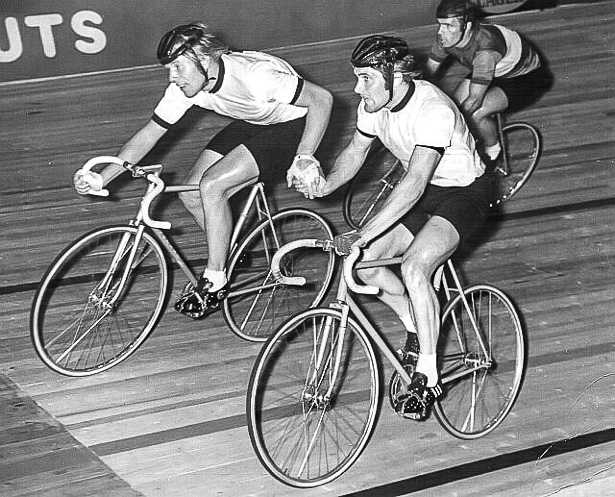
What was the most number of Six Days you rode in one season?
“I think it was 14?”
You must have ridden many of the Six Days which Maurice Burton did – what were your impressions of him as a rider and as a man?
“He was fast but was also smart; he could read a race well.”
You rode one Six with Maurice, Frankfurt in 1980, what do you remember about that?
“Not much, except that neither of us rode very well!”
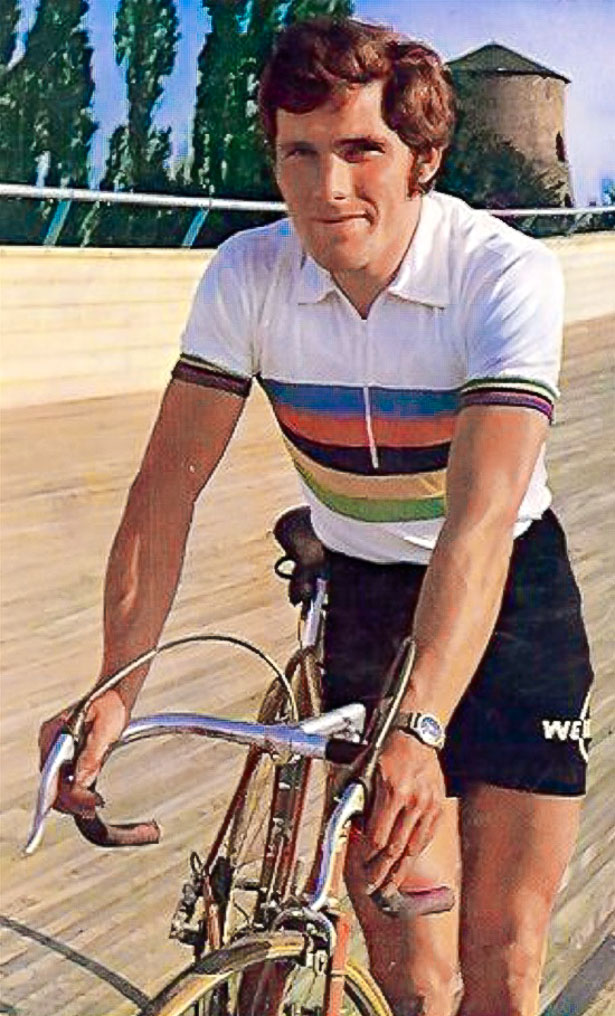
Who was the best partner you ever raced with?
“I was fortunate that I rode with many great riders at my side; Gerben Karstens, Gerrie Knetemann, Don Allan, Leo Duyndam, Günther Schumacher, Sigi Renz, Klaus Bugdahl, Tony Doyle and others like Robert Dill Bundi and Rene Savary.”
What was the hardest aspect of the Six Days for you?
“Probably riding a Derny race in Rotterdam with the wrong gear on the bike!”
Maurice says that the accommodation at Zürich in particular was very bad; what are your recollections of the sleeping and eating arrangements at the Six Days?
“I don’t remember Zürich as being especially bad; they were all pretty basic in those days.
“In terms of the toughness of the racing, I’d say that Rotterdam, Zürich and München were the hardest.”
The travelling between races must have been very hard on you?
“I don’t remember that as being especially hard; we drove big, fast cars – those ones with the star on the bonnet! (Mercedes).
“You could drive from Zürich to Dusseldorf in five hours”
How much do you think the Six Day scene has changed?
“I think there were many more colourful characters back in my time.”
Any regrets about your cycling career?
“Thousands!”
What did you do after you retired?
“I was self employed and worked as a personal trainer – life coach and had my own training centre.”
[vsw id=”0Zvq3gDLbdY” source=”youtube” width=”615″ height=”450″ autoplay=”no”]
Udo chats in the Sportforum Kaarst-Büttgen.
Have you ever been to see a Six Day since you retired?
“For three years I was the race director in Bremen and I organised the ‘Six Days Night’ event there for 10 years.
“I’ve also visited my old colleagues who had moved into management roles at the Münich and Bremen races.”
‘Colourful Characters’ – yes, we could use one or two more of those, for sure.
[With thanks to our friend Ivan for his assistance with translation.]



